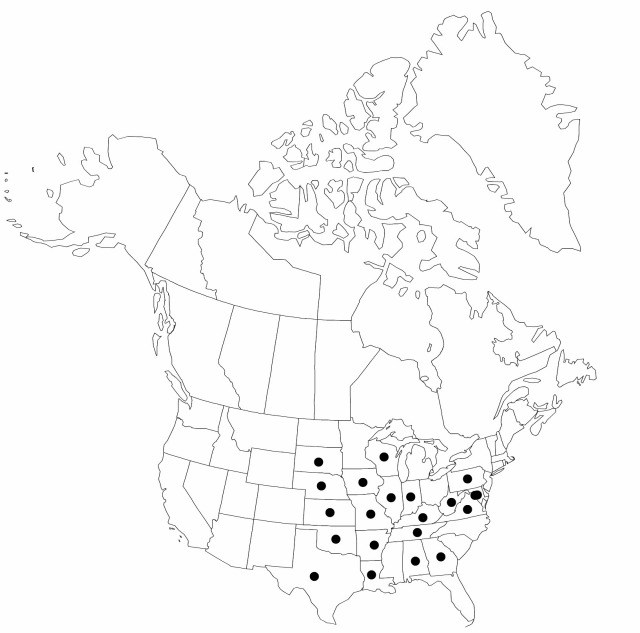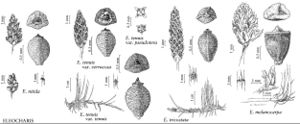Difference between revisions of "Eleocharis tenuis var. verrucosa"
Rhodora 41: 66. 1939.
FNA>Volume Importer |
FNA>Volume Importer |
||
| Line 29: | Line 29: | ||
|elevation=10–600 m | |elevation=10–600 m | ||
|distribution=Ala.;Ark.;D.C.;Ga.;Ill.;Ind.;Iowa;Kans.;Ky.;La.;Md.;Mo.;Nebr.;Okla.;Pa.;S.Dak.;Tenn.;Tex.;Va.;W.Va.;Wis. | |distribution=Ala.;Ark.;D.C.;Ga.;Ill.;Ind.;Iowa;Kans.;Ky.;La.;Md.;Mo.;Nebr.;Okla.;Pa.;S.Dak.;Tenn.;Tex.;Va.;W.Va.;Wis. | ||
| − | |discussion=<p>Occasionally plants of Eleocharis tenuis var. verrucosa are found mostly submerged.</p><!-- | + | |discussion=<p>Occasionally plants of <i>Eleocharis tenuis </i>var.<i> verrucosa</i> are found mostly submerged.</p><!-- |
| − | --><p>Harms used a chromosome number as a basis for raising Eleocharis tenuis var. verrucosa to a species (L. J. Harms 1972), but he did not correlate chromosomes with morphology, and I have not located any of his voucher specimens. There are too few chromosome number reports for use in defining taxa in the E. tenuis complex (A. E. Schuyler 1977).</p> | + | --><p>Harms used a chromosome number as a basis for raising <i>Eleocharis tenuis </i>var.<i> verrucosa</i> to a species (L. J. Harms 1972), but he did not correlate chromosomes with morphology, and I have not located any of his voucher specimens. There are too few chromosome number reports for use in defining taxa in the <i>E. tenuis</i> complex (A. E. Schuyler 1977).</p> |
|tables= | |tables= | ||
|references= | |references= | ||
| Line 54: | Line 54: | ||
|publication year=1939 | |publication year=1939 | ||
|special status= | |special status= | ||
| − | |source xml=https://jpend@bitbucket.org/aafc-mbb/fna-data-curation.git/src/ | + | |source xml=https://jpend@bitbucket.org/aafc-mbb/fna-data-curation.git/src/8f726806613d60c220dc4493de13607dd3150896/coarse_grained_fna_xml/V23/V23_121.xml |
|genus=Eleocharis | |genus=Eleocharis | ||
|subgenus=Eleocharis subg. Eleocharis | |subgenus=Eleocharis subg. Eleocharis | ||
Revision as of 16:05, 18 September 2019
Rhizomes (1–)1.5–2 mm thick, hard, longer internodes 2 mm, scales decaying to fibers. Culms bluntly angled to smooth, seldom deeply sulcate, to 0.5 mm wide. Leaves: distal leaf sheaths without tooth, or rarely with slender apical tooth to 0.2 mm. Flowers: perianth bristles absent. Achenes dark brown, dark green, or yellow, coarsely (to finely) rugose at 10X, usually coarsely cancellate at 10–20X, 6–10 prominent depressions in each vertical series. Tubercles greatly depressed, rarely pyramidal. 2n = 20.
Phenology: Fruiting summer.
Habitat: Fresh, often calcareous, shores, wet woods, ditches
Elevation: 10–600 m
Distribution

Ala., Ark., D.C., Ga., Ill., Ind., Iowa, Kans., Ky., La., Md., Mo., Nebr., Okla., Pa., S.Dak., Tenn., Tex., Va., W.Va., Wis.
Discussion
Occasionally plants of Eleocharis tenuis var. verrucosa are found mostly submerged.
Harms used a chromosome number as a basis for raising Eleocharis tenuis var. verrucosa to a species (L. J. Harms 1972), but he did not correlate chromosomes with morphology, and I have not located any of his voucher specimens. There are too few chromosome number reports for use in defining taxa in the E. tenuis complex (A. E. Schuyler 1977).
Selected References
None.
